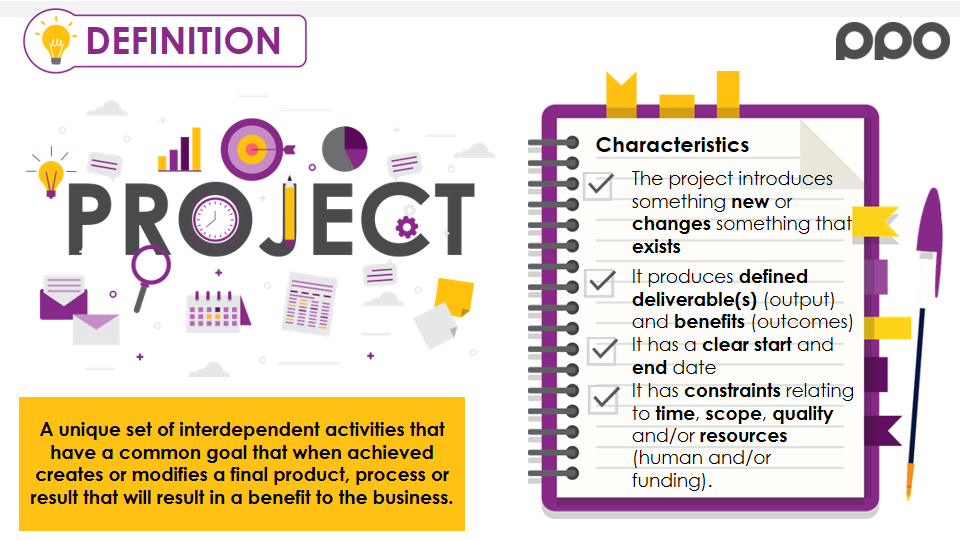Project Portfolio Office (PPO) was designed to help organisations manage their projects, programmes and portfolios and therefore fits within the Project and Portfolio Management (PPM) stable of products. With the growth and change in different work management practices such as a more agile approach to delivery, lean management and even hybrid or flexible working models, locations, and hours, the definition of what is or not a project is something that our clients ask us all the time.
The definition of a project, we believe is:
A unique set of interdependent activities that have a common goal that when achieved creates or modifies a final product, process or result that will result in a benefit to the business.
We believe that while this definition is simple, several organisations still battle to determine whether the work required is best managed as a project. We thus recommend that organisation measures their potential “projects” against these characteristics:
- The project introduces something new or changes something that exists;
- It produces defined deliverable(s) (output) and benefits (outcomes);
- It has a clear start and end date (and for some organisations they go as far as indicating that the minimum duration should be 3 months but most importantly, it can’t go on forever); and
- It has constraints relating to time, scope, quality and/or resources (human and/or funding).
Projects should meet all these characteristics to be best managed as a project. It’s crucial that a project management approach and framework is not applied to business as usual (BAU) functions or processes.
It’s important to note that a project can be one of many types, but the type generally refers to attributes of the project, like:
- delivery methodology (waterfall or agile);
- the responsibility (enterprise or business unit project);
- the scale (strategic or small); or
- or even the executing agent (agency or outsourced project).
Irrespective of the type however, the standard definition and characteristics should be applied.
 The good news is that while PPO relates information to a project, it’s very common for our clients to make use of the PPO functionality that they love for “projects” that are not formally projects (making use of admin projects). Some examples of this usage include:
The good news is that while PPO relates information to a project, it’s very common for our clients to make use of the PPO functionality that they love for “projects” that are not formally projects (making use of admin projects). Some examples of this usage include:
- Professional services organisations register and manage their leads / pipeline of potential projects making use of a Leads entity;
- Organisations make use of an actions entity to manage internal business units actions and tasks that would typically be classified as business as usual (BAU) work; and
- Organisations manage documentation and business processes (travel requests, expense claim forms) making use of the PPO documents, approvals and lifecycle
For organisations who don’t want to introduce a new CRM tool, an action tracker or even other online approval and process flow tools, PPO’s flexibility allows us to easily cater for these functionalities. Ultimately, we want to help our clients make their work easier, irrespective of what that work looks like.
Download our free editable project definition to help you standardise within your organisation.


